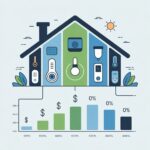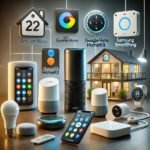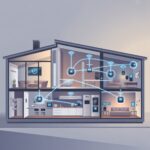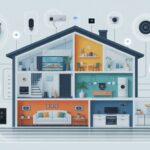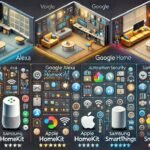Smart Home Applications Course Outline
Course Overview
This course provides a comprehensive understanding of smart home technology, including its applications, installation, configuration, and management.
The course is designed for individuals interested in enhancing their knowledge and skills in creating and managing smart home environments.
Module 1: Introduction to Smart Home Technology
1.1 What is a Smart Home?
- Definition and Overview
- History and Evolution of Smart Home Technology
1.2 Benefits of Smart Homes
- Convenience and Comfort
- Energy Efficiency
- Security Enhancements
- Accessibility
1.3 Key Components of a Smart Home
- Smart Hubs and Controllers
- Smart Devices (lights, thermostats, locks, etc.)
- Communication Protocols (Wi-Fi, Zigbee, Z-Wave, Bluetooth)
Module 2: Smart Home Ecosystems and Platforms
2.1 Popular Smart Home Platforms
- Amazon Alexa
- Google Home
- Apple HomeKit
- Samsung SmartThings
2.2 Comparative Analysis of Platforms
- Features and Compatibility
- Pros and Cons
2.3 Interoperability and Integration
- Understanding Ecosystem Compatibility
- Third-Party Integrations
Module 3: Smart Home Devices and Applications
3.1 Lighting and Climate Control
- Smart Lights and Switches
- Smart Thermostats and HVAC Systems
3.2 Security and Surveillance
- Smart Locks and Doorbells
- Security Cameras and Alarm Systems
3.3 Entertainment Systems
- Smart Speakers and Displays
- Home Theaters and Multi-Room Audio
3.4 Household Appliances
- Smart Refrigerators, Ovens, and Washing Machines
- Robotic Vacuums and Lawn Mowers
3.5 Health and Wellness
- Smart Health Devices (Scales, BP Monitors)
- Environmental Sensors (Air Quality, Humidity)
Module 4: Designing and Planning a Smart Home
4.1 Assessing User Needs and Preferences
- Customizing Solutions Based on Lifestyle
- Identifying Priority Areas
4.2 Budgeting for a Smart Home
- Cost Considerations and ROI
- Phased Implementation Approach
4.3 Designing a Smart Home Layout
- Device Placement and Network Considerations
- Future-Proofing and Scalability
Module 5: Installation and Configuration
5.1 Setting Up Smart Home Hubs and Controllers
- Installation Guidelines
- Initial Configuration and Setup
5.2 Connecting and Configuring Devices
- Step-by-Step Guides for Popular Devices
- Troubleshooting Common Issues
5.3 Creating Automation Routines and Scenes
- Setting Up Schedules and Triggers
- Integrating Multiple Devices for Seamless Automation
Module 6: Managing and Maintaining a Smart Home
6.1 Monitoring and Controlling Smart Home Systems
- Remote Access and Control
- Real-Time Monitoring and Notifications
6.2 Security and Privacy Considerations
- Protecting Your Smart Home Network
- Ensuring Data Privacy and Compliance
6.3 Regular Maintenance and Updates
- Firmware and Software Updates
- Device Health Checks and Troubleshooting
Module 7: Advanced Smart Home Applications
7.1 Voice Control and Natural Language Processing
- Using Voice Assistants Effectively
- Custom Commands and Integrations
7.2 Energy Management and Sustainability
- Smart Energy Monitoring
- Reducing Energy Consumption with Automation
7.3 Integration with IoT and Smart Cities
- Extending Smart Home Capabilities to the Community
- Future Trends in Smart Home Technology
Module 8: Capstone Project
8.1 Project Planning and Design
- Selecting a Project Focus
- Planning and Documentation
8.2 Implementation and Presentation
- Building and Configuring a Smart Home Solution
- Presenting the Project and Demonstrating Functionality
8.3 Evaluation and Feedback
- Peer and Instructor Review
- Iterative Improvements and Final Submission
Additional Resources
- Recommended Reading and Websites
- Tools and Software for Smart Home Management
- Industry Standards and Best Practices
Course Duration
- 8 Weeks with weekly lectures, practical sessions, and assessments.
Assessment Methods
- Quizzes and Assignments after each module
- Capstone Project as a final evaluation
Prerequisites
- Basic understanding of home networking
- Familiarity with smartphones and mobile apps
Target Audience
- Homeowners interested in smart home technology
- Technicians and installers looking to enhance their skill set
- Technology enthusiasts and DIYers
This course outline aims to provide a structured path for learning about smart home applications, ensuring participants gain both theoretical knowledge and practical experience in this rapidly evolving field.



